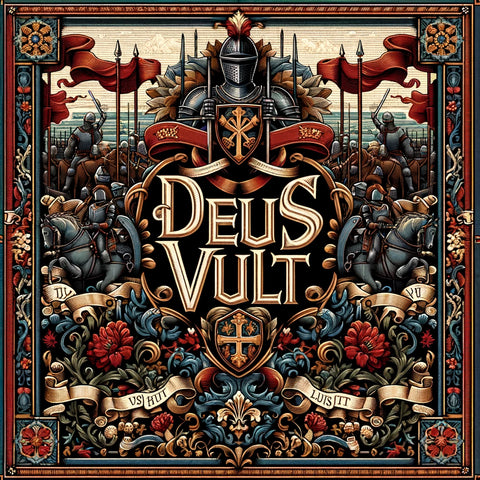The phrase "Deus Vult", Latin for "God wills it," has long been associated with the Crusades and the medieval Christian military orders, including the Knights Templar. But what does it truly mean, and how has its usage evolved over time? This deep dive explores the origins, historical significance, and modern interpretations of this famous cry.
1. The Origins of Deus Vult
📜 Historical Background
The phrase Deus Vult was first recorded in 1095 during Pope Urban II’s speech at the Council of Clermont, where he called for the First Crusade.
It became the rallying cry of Crusaders heading to the Holy Land to reclaim Jerusalem from Muslim rule.

💡 Linguistic Notes
Deus Vult is Latin for "God wills it," but variations like Deus Lo Vult were also used in medieval documents.
2. Deus Vult in the Crusades
⚔️ The Role in Medieval Warfare
The phrase was not just a slogan but a symbol of divine justification for the Crusades.
It united thousands of European warriors under a common cause, reinforcing their belief that they were fulfilling a religious duty.
🛡 Connection to the Knights Templar
The Knights Templar and other military orders adopted religious slogans, though Deus Vult was more commonly associated with Crusaders as a whole.
The phrase likely inspired the Templar motto: Non nobis, Domine, non nobis, sed nomini tuo da gloriam (“Not to us, Lord, not to us, but to Your name give the glory”).
3. The Modern Reinterpretation of Deus Vult
📖 Academic Perspectives
Historians debate the extent to which Deus Vult was truly used as a battle cry versus a later romanticized notion.
The phrase has been referenced in various historical records but may have been exaggerated by later chroniclers.
🎭 Pop Culture & Gaming
Deus Vult has been popularized in video games like Crusader Kings and Medieval: Total War, where it often represents Christian military campaigns.
The phrase appears in historical fiction, novels, and movies depicting the Crusades.
⚠️ Misuse in Modern Times
In recent years, Deus Vult has been controversially adopted by some extremist groups.
Historians and scholars caution against using it without understanding its complex history.
4. How Deus Vult Shaped the Legacy of the Crusades
🏰 Impact on Medieval Europe
The cry Deus Vult helped mobilize entire nations, leading to centuries of conflict between Christians and Muslims.
It reinforced the idea that medieval warfare could be fought under divine sanction.
📜 Influence on Religious Orders
Many chivalric orders, including the Hospitallers and Teutonic Knights, followed similar divine justifications for military campaigns.
The ideology behind Deus Vult persisted even after the fall of the Crusader states.
5. Deus Vult in Today’s Context
🌍 Modern-Day Reflections
In theological discussions, Deus Vult is sometimes referenced in church teachings about divine providence and fate.
Historians argue that understanding phrases like Deus Vult is crucial to separating fact from myth in medieval history.
📢 Should We Still Use the Phrase?
While Deus Vult is a powerful historical phrase, it should be used with caution and context.
Recognizing its historical role while acknowledging its misuse today is key to appreciating its legacy.
Final Thoughts: Why Deus Vult Still Matters
The legacy of Deus Vult remains a powerful reminder of how history, religion, and language intertwine. Whether seen as a battle cry of faith, a historical phrase, or a misunderstood slogan, its impact on medieval and modern narratives cannot be ignored.
What Do You Think?
Have you encountered Deus Vult in historical texts, films, or games? Let us know your thoughts in the comments!
📢 Share this article with fellow history lovers and medieval enthusiasts!



1 comment
Islam is an evil appropriation of Christianity and Judaism. Deus Vault!